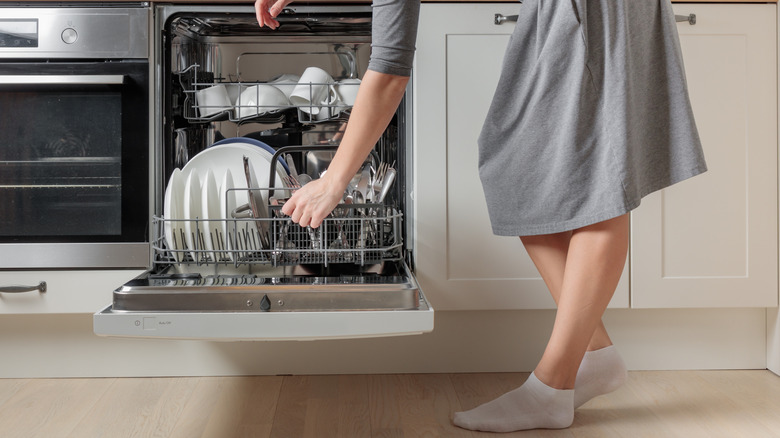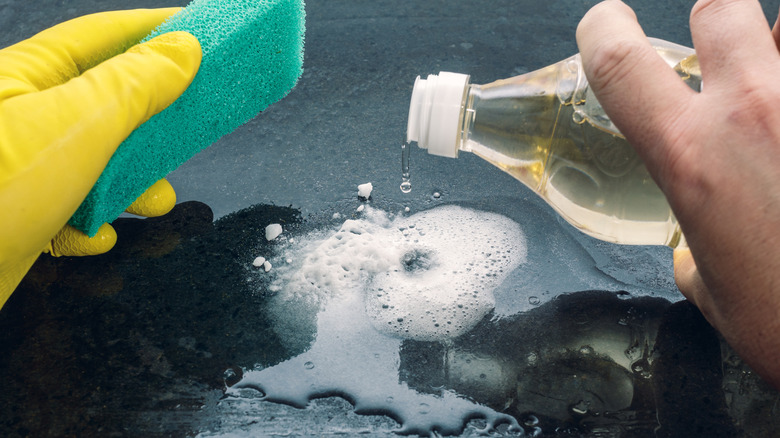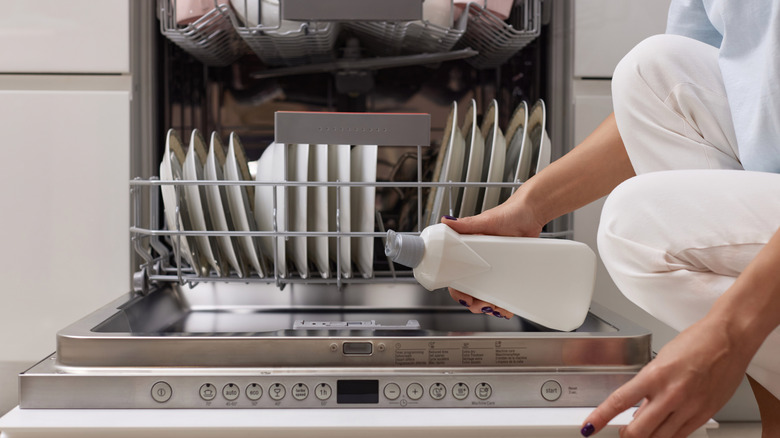Homemade Dishwasher Detergent Ingredients You Should Never Use
If you're interested in making and using homemade dishwasher detergent, it's important to know that your appliance can't handle any cleaning ingredient. While there are several unexpected things you can clean with dish soap, using the liquid in the dishwasher is a no-no as it'll become too bubbly and overflow, risking damage to the machine and your lovely kitchen floors. When looking for something you can substitute for dishwasher detergent, save the laundry detergent for the washing machine— it leaves a residue on dishes and inside the appliance. Meanwhile, vinegar is corrosive, while baking soda can be too abrasive and create scratches with regular use.
Most dishwasher manufacturers specify you should only use specific dishwasher detergent such as tablets or powders. Sticking with the designated products can extend your appliance's life and improve the cleanliness of your dishes and glasses. Still, some people may want to try their own DIY mix to avoid chemicals, save money, and reduce use of plastic bottles.
A good DIY recipe to consider is a combination of borax, citric acid powder, salt, and washing soda. Borax is effective at residue and stain removal, while the washing soda lives by its name and handles the washing. Then there's the salt and citric acid, which can help soften hard water — a process that prevents unsightly dishwasher stains. Otherwise, with the wrong DIY dishwasher detergent ingredients like vinegar and dish soap, you risk expensive damage and can void your appliance warranty.
Use vinegar on the outside surface or place it on a rack
Vinegar can be a versatile cleaning tool, but it isn't an ideal choice to use for DIY dishwasher detergent since its corrosive properties can damage the rubber seals and hose. The rubber seal or gasket prevents water from escaping once you shut the door, and the hose carries fresh water in from plumbing and dirty water to the sink drain. When these parts fail, the dishwasher can leak, which can lead to costly repairs on both the appliance and the surrounding areas, such as your kitchen floor or walls.
Did you know that vinegar can also discolor your dishes, flatware, and metal pans? This can happen if it mixes with any salt from food left on your dishes. A combination of vinegar and dish soap in a DIY detergent mixture can be pointless since they neutralize the other, making them ineffective at cleaning. However, you can safely use it by placing it in a bowl on the top shelf during a rinse cycle — not as part of the detergent mix — where its air particles can work their magic by deodorizing and loosening interior buildup.
Any corrosive damage makes it easy to risk your warranty, which isn't a small matter. Expect to pay out-of-pocket for dishwasher repair or replacement if you use such damaging DIY ingredients. The average repair costs as low as $50 and as high as $600.
Save the liquid soap for sink washing
It may be easy to assume dishwashing soap is fine for your dishwasher due to the foamy lather that your dishwasher soap produces. While those types of soaps naturally produce lots of suds, it's not good for the machine. On the other hand, dishwasher tablets and powders are developed to clean without producing any suds as they use enzymes instead. Those thick bubbles produced by dish soap must go somewhere, so they usually overflow out of your appliance and onto the floor. As a result, your dishwasher pump and motor becomes susceptible to damage. Those suds may also create buildup in the metal interior, which can clog the filters. When you break down average dishwasher repairs by parts, the motor is the most costly one, with a range of $200 to $500.
A clogged filter will become an obvious menace even when the machine is off due to foul smells from decomposing food particles. You may also notice standing water at the bottom of the dishwasher due to a lack of drainage. That same liquid can leak out from the bottom and warp or swell the floorboards under the appliance. It will be harder to clean your dishes as restricted water flow from the clog pump won't spray properly, and the filter won't be able to trap and remove food particles.


